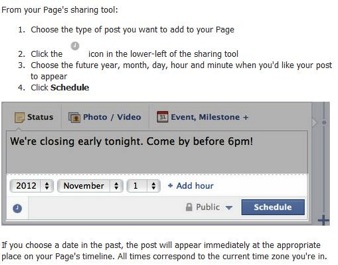 As per usual, Facebook is facing further changes to its design. We Facebook users are often frustrated by the constantly-changing format. Hands up if you felt an inner turmoil when you logged on to Facebook and realized that the Powers That Be changed your page to Timeline . . . Am I right in saying those are a lot of hands? Perhaps it’s just that we’re creatures of habit, and we prefer change to happen in small doses than large ones, if at all. Yet this new change may be a ray of hope for businesses trying to establish themselves using Facebook.
As per usual, Facebook is facing further changes to its design. We Facebook users are often frustrated by the constantly-changing format. Hands up if you felt an inner turmoil when you logged on to Facebook and realized that the Powers That Be changed your page to Timeline . . . Am I right in saying those are a lot of hands? Perhaps it’s just that we’re creatures of habit, and we prefer change to happen in small doses than large ones, if at all. Yet this new change may be a ray of hope for businesses trying to establish themselves using Facebook.
Facebook, as many know, was initially available exclusively college students with college IDs, allowing them to connect easily with fellow peers and friends via the Internet. As the concept of networking through the Web grew in popularity, it allowed not only college students, but also high school students and adults. With the popularity of Facebook in many social circles, businesses began using Facebook to connect with potential clients seemed to have been lost in the crowd. The average person is connected to 60-80 businesses or community pages through Facebook. However, regardless of the fact that 1 million business pages get a new “like” every day, businesses seemed to be overlooked by this social network. That is, until recently.
Nearly all Facebook users will “Like” pages that are relevant to their interests. These pages are controlled by Administrators who run the page. This may be all well and good for some people, but this holds a number of potential risks for businesses trying to bring in customers. As an Administrator each person, regardless of their role in the company, has the power to control virtually anything having to do with the page, regardless of his or her status within the company itself. Not only can Administrators update posts and upload information to the page, but they can also go so far as to delete the page.

Recently, Facebook has done extensive work on their Administrator capabilities for Business Pages by creating specific roles: manager, content creator, moderator, advertiser, and insights analyst. Below is a table explaining the abilities of each role.

With these roles, administrators are delegated specific tasks that allow each individual a certain amount of power. Not just any Administrator, for example, can edit the page.
Additionally, businesses on Facebook often struggled with one specific question: How do I time a post so that it appears later? Yet another update made by Facebook, you can now schedule a post to appear at a different time than when it was first written.

Now posts can be scheduled up to six months in advance. Will this be yet another confusing, annoying change that Facebook throws at us? Not this time. Instead, businesses targeting Facebook users may find the updates more beneficial and conducive to their marketing abilities via the Web. Employees working on a page can now be delegated specific tasks, ensuring a more conducive and structured work space on the site. With the new ability to set a timer for posts, users will find that scheduling is more structured, well-thought, and better planned.
Facebook, this time you’ve done good.


 This article was written by Alyssa McCluskey – Online Marketing Strategist at
This article was written by Alyssa McCluskey – Online Marketing Strategist at